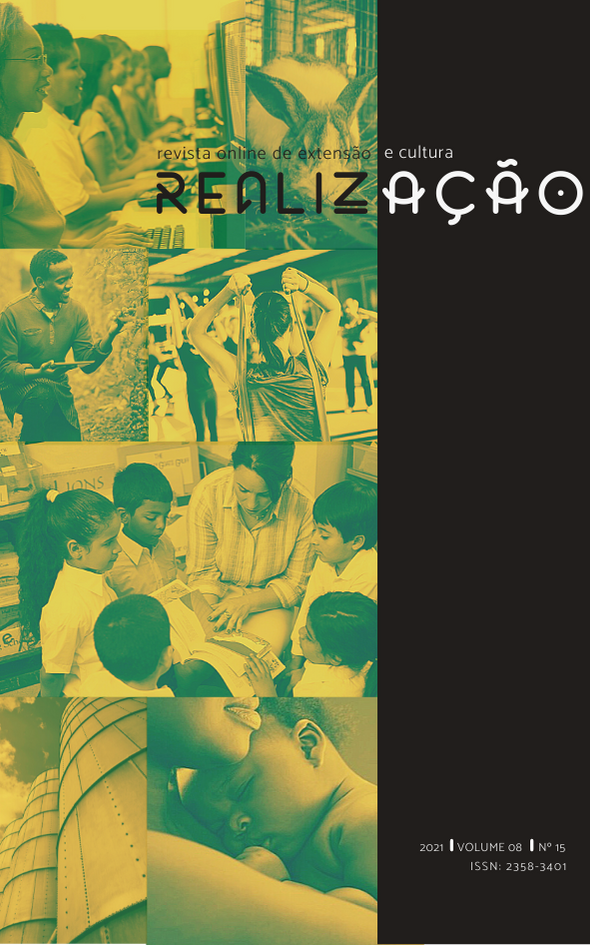Comparative analysis of computational thinking skills with high school students
DOI:
https://doi.org/10.30612/realizacao.v8i15.12596Keywords:
Teaching, Active methodology, Block programming, App inventorAbstract
The inclusion of technology in public schools enables the acquisition of skills necessary to solve various problems, and can support and relate to other subjects also taught in schools. In this context, this study aimed to identify, through the application of a test, the knowledge of high school students from a state school, before and after the activities of the course “Programming for Cell Phones” offered by the extension project entitled “Inclusion of high school students from the public network in the exact sciences through the practice of logic and programming” linked to the extension program PROBEX of UFCG-Universidade Federal de Campina Grande. The aforementioned test in the area of “Computational Thinking” was developed by Román-González (2015), and applied in the project. It consists of 28 questions, which attempt to identify the ability to form and solve problems, based on the fundamental concepts of Computing. Although the sample size is not statistically significant, the results indicate the effectiveness of the workshop in relation to learning computing content, which can be used to improve computing teaching in high school education in Cariri, Paraíba.
Downloads
References
ALMEIDA, M E de. Informática e formação de professores. Brasília, Ministério da Educação, 2000.
BRASIL. MEC Base Nacional Comum Curricular, Brasil, 2018. Disponível em: <http://basenacionalcomum.mec.gov.br/>. Acesso em: 13 jul. 2019.
Computer Science Teacher Association CSTA. The New Educational Imperative: Improving High School Computer Science Education. Final Report of the CSTA. Curriculum Improvement Task Force. ACM - Association for Computing Machinery, 2005.
DANIEL, G. T. et al. Ensinando a Computação por meio de Programação com App Inventor, In: COMPUTER ON THE BEACH, 2017, Florianópolis, p. 357-365. Resumos... Florianópolis: COTB, 2017.
DAGHOSTINI et al. URI Online Judge Blocks: Construindo Soluções em uma Plataforma Online de Programação. In: Simpósio Brasileiro de Informática na Educação, 2018, Fortaleza. Anais... Fortaleza: SBSI, 2018. DOI: https://doi.org/10.5753/cbie.sbie.2018.168
Encyclopedia of Curriculum Studies, SAGE Publications. Lye, S. Y., Koh, J. H. L. Review on teaching and learning of computational thinking through programming: What is next for K-12?. Computers in Human Behavior, v. 41(C), p. 51-61, 2014. DOI: https://doi.org/10.1016/j.chb.2014.09.012
FERNANDES, C. S.; MENEZES, P. B. Metodologia do Ensino de Ciência da Computação: Uma Proposta Para Criança. In: WORKSHOP DE INFORMÁTICA NA ESCOLA, 2011, Fortaleza, CE, Resumos... Fortaleza: WIE, 2011.
FREITAS, R. S. da S.; SANTOS, R. V.; PEREIRA, M. F. F.; Da SILVA, D. C.; ALVES, F. J. da C. O uso de tecnologias de informação e comunicação no processo de ensino-aprendizagem da matemática: desenvolvimento de aplicativos com o app inventor. In. XII ENCONTRO NACIONAL DE EDUCAÇÃO MATEMÁTICA, 2016, São Paulo. Resumos... São Paulo: ENEM, 2016.
FERREIRA, A. M.; LIMA, J. F.; OLIVEIRA, D. P.; COSTA, L. C.; NUNES, E. R. Aprendendo lógica de programação de maneira lúdica. In: XI Simpósio de Informática, 2019, Minas Gerais. Resumos... Minas Gerais: IFNMG, 2019.
GROVER, S., PEA, R. Computational Thinking in K–12 A review of the state of the field, Educational Researcher, v. 42, n. 1, p. 38-40, 2013 DOI: https://doi.org/10.3102/0013189X12463051
KRAMER, JEFF. Is abstraction the key to computing? Communications of the ACM, v. 50, n. 4, p. 36-42, 2007. DOI: https://doi.org/10.1145/1232743.1232745
LUFT, C. P. Dicionário Luft. São Paulo: Ática, 2006.
Ministério da Educação de Ontário – MEO. (2008). Currículo para o ensino de Ciência da Computação nas escolas. Disponível em: . Acesso em: 14 abr. 2019.
MIT - Massachusetts Institute of Technology. (2012) App Inventor for Android, Disponível em: <https://appinventor.mit.edu>. Acesso em: 10 jan. 2019.
ORTIZ J. S. e PEREIRA R. Um Mapeamento Sistemático Sobre as Iniciativas para Promover o Pensamento Computacional, In: SIMPÓSIO BRASILEIRO DE INFORMÁTICA NA EDUCAÇÃO, 2018, Fortaleza, Resumos...Fortaleza: SBSI, 2018. DOI: https://doi.org/10.5753/cbie.sbie.2018.1093
ROMÁN-GONZÁLEZ, M. Computational thinking test: Design guidelines and content validation. EDULEARN15, pages 2436–2444, 2015.
SANTOS, P. S. C., ARAÚJO, L. G. J., BITTENCOURT, R. A. A Mapping Study of Computational Thinking and Programming in Brazilian Education. In: THE 8th ANNUAL FRONTIERS IN EDUCATION CONFERENCE, 2018, San Jose, EUA. Procs..., San Jose, 8th AFEC, 2018. DOI: https://doi.org/10.1109/FIE.2018.8658828
VALENTE, J. A. Computadores e conhecimento: repensando a educação. Campinas: UNICAMP. 1993.
WING, J. M. Computational thinking, Communications of the ACM, v. 49, n. 3, p. 33, 2006. DOI: https://doi.org/10.1145/1118178.1118215
Downloads
Published
How to Cite
Issue
Section
License
Copyright (c) 2021 Cecir Barbosa de Almeida Farias

This work is licensed under a Creative Commons Attribution-NonCommercial-ShareAlike 4.0 International License.
Autores que publicam nesta revista aceitam as normas de publicação, bem como, concordam com os seguintes termos:
(a) O Conselho Editorial se reserva ao direito de efetuar, nos originais, alterações da Língua portuguesa para se manter o padrão culto da língua, respeitando, porém, o estilo dos autores.
(b) Autores mantêm os direitos autorais e concedem à revista o direito de primeira publicação, com o trabalho simultaneamente licenciado sob a Creative Commons Atribuição-NãoComercial-CompartilhaIgual 4.0 Internacional que permite: Compartilhar — copiar e redistribuir o material em qualquer suporte ou formato e Adaptar — remixar, transformar, e criar a partir do material. A Creative Commons Atribuição-NãoComercial-CompartilhaIgual 4.0 Internacional considera os termos seguintes:
- Atribuição — Você deve dar o crédito apropriado, prover um link para a licença e indicar se mudanças foram feitas. Você deve fazê-lo em qualquer circunstância razoável, mas de nenhuma maneira que sugira que o licenciante apoia você ou o seu uso.
- NãoComercial — Você não pode usar o material para fins comerciais.
- CompartilhaIgual — Se você remixar, transformar, ou criar a partir do material, tem de distribuir as suas contribuições sob a mesma licença que o original.
- Sem restrições adicionais — Você não pode aplicar termos jurídicos ou medidas de caráter tecnológico que restrinjam legalmente outros de fazerem algo que a licença permita.


